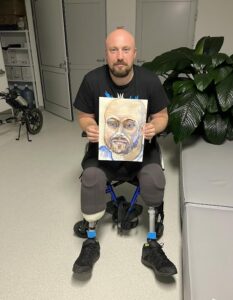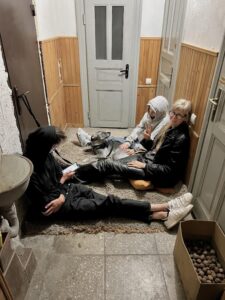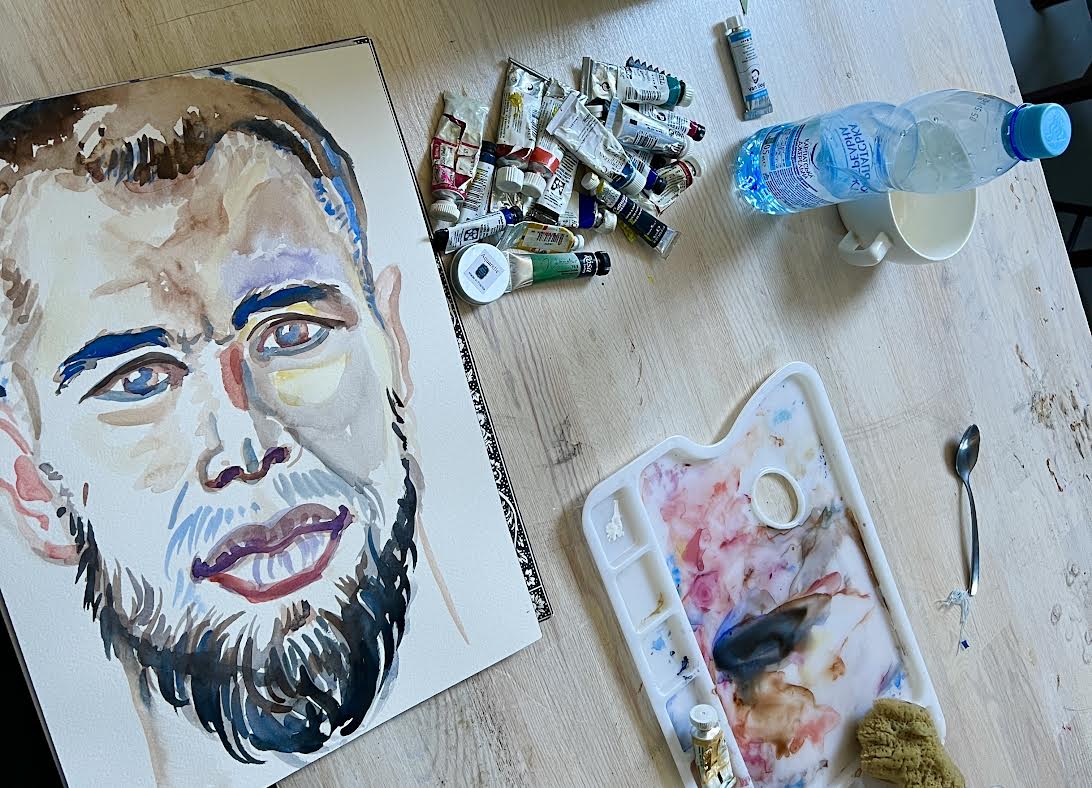September 19th continued
My time is constrained, so I paint my last soldier, Taras, where I find him, sitting outside the elevators. The lighting is adequate. He lost both legs below the knee. With eyes that are kind and intelligent, he’s a bit shy, and it’s hard to look him in the eyes as I feel his shyness somatically. We’re both blushing, but the process of painting grounds me. When I ask what’s next for him, he says he’ll become a military instructor, training the next set of recruits. I say he’ll be an excellent instructor as he has experience. He replies ”I have deep experience.” He loves the portrait and is very grateful. He feels very honored to be painted.

I catch Sergiy, the blue-eyed, cheekboned warrior I’d previously painted the other day, sitting in the hallway and I instinctively bend down to hug him. As he gets up and hobbles toward the elevator, I ask him using crude sign if he’ll be able to walk again and he nods yes, enthusiastically. We both smile.
(He messaged me months later to say that the doctors were instead going to fuse his knee joint. I insisted he ask them to do so in a way that it could potentially be reversed if there are advancements made in prosthetic joints.)
That same night, Andriy walks me down the driveway to deliver a completed portrait to one of the guys, and we have a kind of mini-reunion with Sergiy and his family coming to take him home. I can feel Andriy has already distanced himself emotionally from me, having already expressed his deeper goodbye to me when I saw him last. “See you next time” I have learned to say (goodbye is verboten) – “See you later” he replies. “Or sooner” I assure him.
Throughout my visit, the staff at both Superhumans and Unbroken quietly observed my interactions with the soldiers, their smiles quietly expressing their support, appreciation, and fondness toward me.
My last day. As we drive off, my taxi driver asks if I am a visiting doctor. I explain why I am here and show him images of the portraits captured on my phone. When he drops me off at home he refuses his cab fare. I insist he get out of the car for a hug and say “Slava Ukraini.” “Heroim slava” he replies. Glory to Ukraine. Glory to the heroes.
Sept 20
4:00 am, day of departure
Third night in a row, air raid sirens. This time Yuliana is home with us. She has a comprehensive phone app (available only in Ukrainian language) that gives minute-by-minute updates and details of arial invasions. Now: drones. Shaheds. Swarms of them heading our way. Down to the basement we go. Our neighbor, sheltering with us, pops open both back doors and checks the sky. “Very clear. Many stars. Good night to fly drones.” Apparently, many are constructed of plastic and therefore, difficult to track. There are groups of retirees in Kyiv who wait on their city’s rooftops with rifles, shooting down drones. The neighbor informs me that drones sound like motorini.

The app updates. The drones continue approaching. Then, a noise. Above us, the sound of a motorino. “Do you hear it?” he asks. “Yes” I answer, then, after a beat “I think it’s time to close both doors.”

Nestor, Yuliana and I squat on the carpet remnant, propped up on antiquated cushions. Our neighbor stands. We joke about him getting a chair for these occasions, and I recommend a Lay-Z-Boy lounger. This is how we deal with the stress. We have our pup and our neighbor, his aging golden retriever. They become our emotional support animals.
Oddly, there is a decorative water fountain in the basement hallway across from us and I tease them they need a wet bar down here, given the number of air raid alerts. I’m texting with David back in America and he’s distraught. “Please, please be safe!” – “I’m doing my best.” The rest is up to fate, to chance. I tell him about the wet bar and he admonishes me. “Forgive me if I worry” – “I’m simply coping” – “As am I.” Then after a long pause, he adds “DJ”.
A loud explosion. I turn to our neighbor – “Air defense shot it down.” They are able to distinguish the sound of a missile, air defense system engaged, a drone, and …a garbage truck. I’m startled by a loud crashing sound blasting from the front of the house. He explains “Garbage truck. Even in a war, someone has to pick up the garbage.”
And that is the parallel lived experience here in Lviv, and most of Ukraine; avocado toast with cappuccino in the morning, basement-cum-bomb shelter after dark. Three nights of sleep disruption and you still need to show up for work in the morning, every morning. No one gets a hall pass.
David and I are concerned the train station in Lviv may have been targeted; no train, no leaving Ukraine in time for my flight to Italy. I’m grateful the station was not targeted, grateful I get to leave before things get more interesting here, sad and guilty to be leaving my new friends behind. Survivor’s guilt. But I’m their new messenger and can generate more value for them outside their country than inside.
My things packed, I say goodbye to Senna the dog. Yuliana insists I leave behind my small watercolor bloc, so that I must return to paint in it. Nestor takes me to the station. Traffic is gridlock, but I’ve padded my time appropriately. He walks me to the platform and waits. Eye contact, followed by three hugs goodbye (see you later?). I will miss him, such a young, sensitive man.
Our lives are intertwined now, mine with the Ukrainians. I’m selfishly lucky in that most of my soldier friends won’t be returning to the front. Bizarre to imagine amputees as lucky.
Prior to my trip, David insisted it would be difficult to capture the look in the soldiers’ eyes. I defend my process and my abilities. No problem. He presses me to paint full figure portraits, to show their injuries. I refuse, at least for now. I want my audience to see them first and foremost as human beings, with deep experience and wisdom in their eyes, scars on their faces. The expression in those eyes is my greatest single experience from my entire adventure in Ukraine, bearing witness and transmitting what I see and feel to the rest of the world.
Sixteen portraits.
Meanwhile, more trips to Ukraine if possible. More visual context from my soldiers and their brothers-in-arms at the front. Shattered forests and piles of rubble where villages once housed communities. This is a battle between freedom and oppression. It eclipses politics. It is about humanity.
I must say, in the ten days I spent in Ukraine, I garnered a lifetime’s worth of experience and appreciation.

